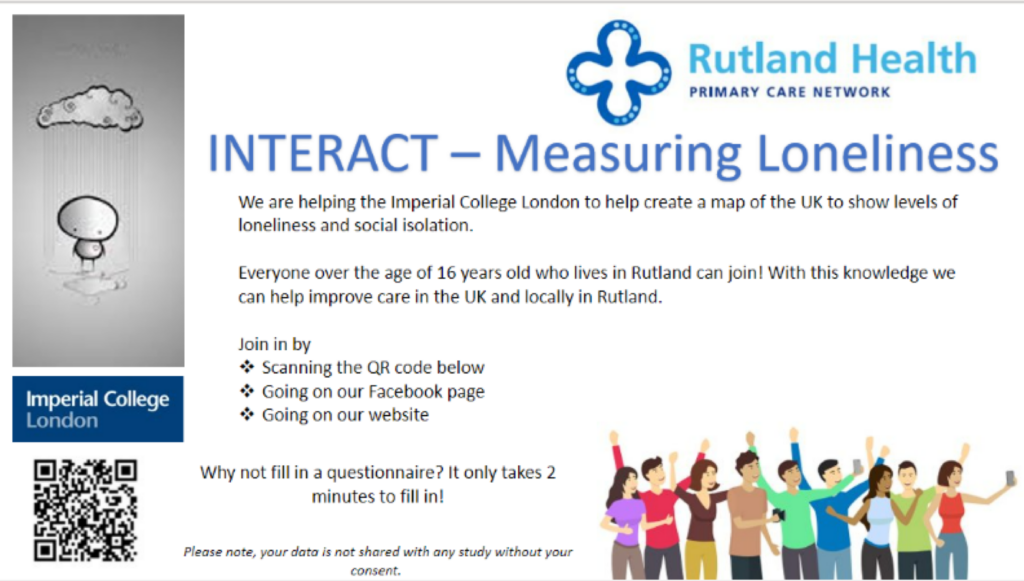Empingham Medical Centre, Research Active Since 2011
Empingham Medical Centre have been a research friendly surgery since 2011; we work along with the National Institute of Health Care & Research (NIHR) to offer patients the chance to learn more about their medical condition, try new treatments and help others in the future manage their conditions.
Did you know Empingham Medical Centre won a 1st place award for the highest number of patients in taking part in research across the East Midlands. They won against Leicestershire, Lincolnshire, Derbyshire, Nottinghamshire & Northamptonshire!
Taking part in research is optional. Dr Eaves is the lead GP for the surgery. There is always a study coordinator you can speak to if you have any questions before signing up.
A study coordinator is someone from the research team who knows all about the study and is the lead for it.
Information on how to contact them will be in the invitation pack you receive.
There is also the research lead for Empingham Medical Centre which is Eilidh who selects the research studies for our patients. We always try to choose studies which are relevant to our community.
If you have any suggestions of a health topic you would like us to be part of then let Patient Services know!
Research studies may be sent to you via text message or in the post. For example, the diabetes study called CODEC was posted to patients who have a diagnosis of diabetes. Some patients may have been excluded due to other health conditions.
Our Research Studies
2025
MiFOOT

MiFOOT is a research study for patients diagnosed with Type II Diabetes and are presently or have previously had Diabetes related foot ulcers. The aim is to improve their cardiovascular (heart) health by providing:
- A one to one session with a health care professional
- Group-based education and exercise sessions
- An online platform designed to support patients to live a healthy lifestyle
This study is being held by the Leicester Diabetes Centre.
Phone: 0116 258 4732
Email: MiFoot@uhl-tr.nhs.uk
Website: https://www.mifoot.org.uk/
Pearls

Proactive against reactive therapy for the prevention of lichen sclerosus exacerbation and progression of disease
Vulval Lichen Sclerosus (LS) is a chronic inflammatory condition, with incidence peaking in childhood and post-menopause. Reported prevalence is up to 3%, affecting around 1 million women in the UK.
Inflammation causes whitening of vulval tissue, bleeding under the skin, texture change and cuts. Patients report itching, pain (particularly during sex) and discomfort in daily activities. This study is to see if a cream applied regularly rather than when symptoms flare has better benefits for the patient.
Nottingham University
Email: PEARLS@nottingham.ac.uk
Imperial

This national survey has been designed by the Imperial College London and is funded by the Imperial Health Charity, MacMillan Cancer Support and the Brain Tumour Research Campaign.
The national survey is for all people who have been diagnosed with cancer at any time in their adult life. Imperial College London would like to know about the positive and negative aspects of your cancer diagnosis and treatment and how this may have affected your life. By sharing your experiences, you will be joining in helping to improve the care, treatments and services people receive.
Before you decide to complete the survey, it is important for you to understand why the research is being done and what it will involve. Watch the video below to find out more information.
To fill out the survey, click on the website link below
A Patient Information Leaflet (PIL) has been created by the study team which answers many questions you may have about the survey.
Computational Oncology Laboratory
As always, all research studies, questionnaires and surveys are optional to complete. If you would prefer to not complete the survey, please ignore the text message you have received.
2024
FreeDM2 Study

Real-Time Glucose Monitoring Using FreeStyle Libre 3 in Adults With Type 2 Diabetes On Basal Insulin Plus SGLT2 Inhibitor and/or GLP-1 (FreeDM2)
The aim of the FreeDM2 study is to see if a patient using the FreeStyle Libre 3 device will improve a patient’s diabetes management over a 32 week period. If a patient is not included to use the FreeStyle Libre 3 device in the initial part of the study, the patient will be given the opportunity to use the device once they have completed their part of the study.
This is a commercial study but has been promoted by the National Institute for Health & Care Research (NIHR, NHS research organisation) and the Leicester Diabetes Centre.
2023
Artificial intelligence in Primary Care spirometry pathways
for diagnosis of Lung Disease (APRIL)
Empingham Medical Centre is working alongside Uppingham Surgery, Oakham Medical Practice and Market Overton & Somerby Surgeries. Any patients who require a spirometry to diagnose asthma, COPD or another respiratory condition, are offered the chance to assist with the development of a new artificial intelligence (AI) software by sharing their spirometry report with the study team. Patient details will be removed to ensure the patient is non identifiable. The study team will use the spirometry report on their AI software to see if it is able to diagnose the patient in the same way a respiratory clinician can.
Those eligible for the study will be introduced to the study when they are offered a diagnostic spirometry appointment at Empingham Medical Centre.
2022
Active Brains


Southampton University have made a new website called ‘Active Brains’ which aims to help adults aged between 60 and 85 years old to look after their brain and body health. The aim is to help prevent problems with things like remembering, concentrating or reasoning (known as cognitive decline). The website will help adults to make simple changes such as getting more active, playing brain training games and finding ways to eat more healthily.
150 patients have been selected at random and will receive a mail pack offering them the chance to participate.
If you have received your mail pack you can click on this link to enter the Active Brains Study.
Measuring Loneliness

Loneliness and social isolation can affect people of all ages and from all walks of life. The Measuring Loneliness (INTERACT) study aims to map loneliness at borough and city level to highlight the scale of the issue and help decision makers consider new ways to support individuals who are lonely, feeling socially isolated and who may be suffering in silence. The study is the first of its kind and aims to collect data from thousands of community dwelling individuals aged 16 years or over to produce a visual snapshot of social isolation and loneliness across the capital, and other parts of the UK.
Any patient from ANY RUTLAND PRACTICE OR LIVES in Rutland can complete the survey. The study is based on your postcode and not which GP surgery you are registered at.
Please click on the link below for more information or to complete the survey!
CODEC Study


Research has shown that people who have later bedtimes (colloquially called ‘night owls’) are more likely to develop diabetes and other health problems, such as heart disease. This still holds true, even when the night owls get the same number of hours sleep as early risers. The underlying causes have not been clearly defined, but appear to be related to ‘circadian misalignment’. This is where societal pressures, such as work shifts, force us to wake earlier or stay awake longer than we naturally would.
The CODEC study aims to identify the chronotypes in patients with type 1 and type 2 diabetes to find out what impact, if any, the chronotype (e.g. ‘night owl’ or ‘lark’) has on the patient’s ability to control their blood sugar levels, among other biological measures.
The Profile Study

Understanding the genetics that influence risk of prostate cancer could improve the way we screen men for prostate cancer in future, and help more men get diagnosed and treated early.
Click on the link below to watch a video about the study to find out more.
STATIC Study

Stopping Aminosalicylate Therapy in Inactive Crohn’s Disease (STATIC)
The STATIC study aims to look at the treatment of people who have a diagnosis of Crohn’s Disease by reviewing the current medication used. Please see the video below which provides more information regarding the study.
Frequently Asked Questions
Data Protection
No data or information is passed onto the research study. It is only when a patient signs up to the study that information is exchanged; at any point a patient can decline a study and all data stored is subject to the General Data Protection Act 2018.
The doctors and staff involved in studies follow the Good Clinical Practice and the Declaration of Helsinki.
The World Medical Association (WMA) has developed the Declaration of Helsinki as a statement of ethical principles for medical research involving human subjects, including research on identifiable human material and data.



